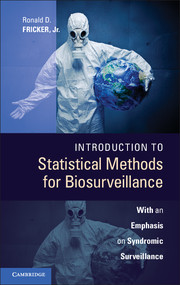Book contents
- Frontmatter
- Content
- Preface
- Acknowledgments
- Part I Introduction to Biosurveillance
- Part II Situational Awareness
- Part III Early Event Detection
- 6 Early Event Detection Design and Performance Evaluation
- 7 Univariate Temporal Methods
- 8 Multivariate Temporal and Spatio-temporal Methods
- Part IV Putting It All Together
- Part V Appendices
7 - Univariate Temporal Methods
from Part III - Early Event Detection
Published online by Cambridge University Press: 05 March 2013
- Frontmatter
- Content
- Preface
- Acknowledgments
- Part I Introduction to Biosurveillance
- Part II Situational Awareness
- Part III Early Event Detection
- 6 Early Event Detection Design and Performance Evaluation
- 7 Univariate Temporal Methods
- 8 Multivariate Temporal and Spatio-temporal Methods
- Part IV Putting It All Together
- Part V Appendices
Summary
At the present time, even a good surveillance system is perhaps best viewed as a “smoke detector.” They may pick up important public health diagnoses or syndromes, but only labor-intensive follow-up investigations will distinguish genuine fires from backyard barbecues.
Michael Grey and Kenneth Spaeth (2006, p. 76)This chapter describes univariate temporal methods useful for early event detection (EED) and how to appropriately apply them to the biosurveillance problem. Biosurveillance systems often apply variants of standard univariate statistical process control (SPC) methods – the Shewhart, cumulative sum (CUSUM), and exponentially weighted moving average (EWMA) methods – for EED. A challenge in applying these methods to biosurveillance is that the data often violate classical SPC assumptions, particularly the assumptions of normality and independent and identically distributed observations.
When applied to biosurveillance, the Shewhart, CUSUM, and EWMA methods should be tailored to the biosurveillance problem and data. For example, biosurveillance is generally only focused on detecting increases in disease incidence, and thus the methods should be designed only to signal for increases. (In SPC parlance, these are “one-sided control chart” problems.) In addition, because biosurveillance data frequently contain various systematic effects, the methods should be applied to the residuals from a model designed to remove such effects, not the raw data itself.
Information
- Type
- Chapter
- Information
- Introduction to Statistical Methods for BiosurveillanceWith an Emphasis on Syndromic Surveillance, pp. 178 - 217Publisher: Cambridge University PressPrint publication year: 2013
Accessibility standard: Unknown
Why this information is here
This section outlines the accessibility features of this content - including support for screen readers, full keyboard navigation and high-contrast display options. This may not be relevant for you.Accessibility Information
- 1
- Cited by
